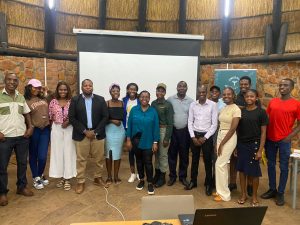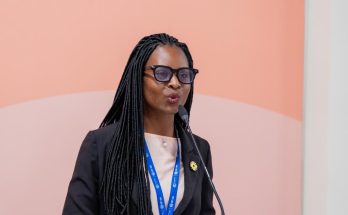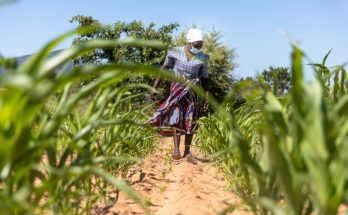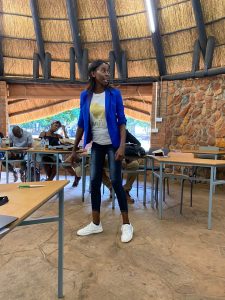
DELEGATES who attended last Friday’s roundtable discussion in Harare to deliberate on the role of women in the fight against climate change effects and climate financing unanimously agreed that there is need to form organisational partnerships among stakeholders in order to attract financing for various climate adaptation and mitigation related projects, while there is also need to do away with traditional biases that disadvantage the girl child.
The discussion which was held to deliberately coincide with International Women’s Day ran under the theme, “Invest in Women: Accelerate Progress” and it brought together climate experts, negotiators, government officials, the media and academia, regardless of gender.
Climate organisation, Emerald Climate Hub in conjunction with SHE Climate Change made the event possible and promised that more of such events were on the cards so that climate issues can be openly discussed, while solutions are be proffered from a stakeholder participatory approach.
Emerald Climate Hub Programs Manager, Rumbidzo Mundangepfupfu who was moderating the discussions emphasised the need for delegates to have a no-holds barred discussion that would yield positive results in terms of achieving gender equity in climate change matters. In that same vein, the quality of interactions lived up to expectations of the hosts.
Speaking at the event, Christina Madzinga from the Sisonke Project bemoaned the fact that women in Africa own the least in terms of land, yet they are the most exposed and vulnerable when it comes to climate change effects owing to their gender ascribed roles in society such as fetching firewood and water while also going to till the fields, more often with babies strapped on their backs.
“It is worth noting that climate financing goes beyond allocation of monetary resources, but rather all resources such as human capital, that are allocated to support climate action programs. Women and children thus deserve to get a fair share of such resource allocation as they are the most vulnerable in society. It is a case of women are putting in the most effort and yet getting the least benefits at the moment,” she said.
Amanda Munyoro, from Women in Farming and Entrepreneurship (WIFE) weighed in saying the need for collaborations among like-minded organisations was of utmost importance if opportunities to get project financing and other resources were to be secured.
“We should desist from working in isolation, as this will only result in us being doomed. Instead, we should create synergies so that we complement our various skills and move away from working in isolation.
“We have noted with concern that most of the time we miss out on grant opportunities because of poor quality proposals which lack depth. This can easily be dealt with by way of partnering with organisations that may have the relevant expertise in that field that needs financing,” she said.
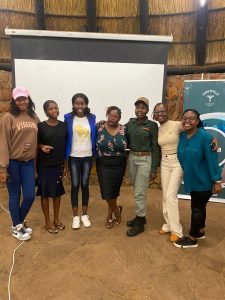
Some of the female delegates who attended the discussion
National Coordinator at Rima in Africa Trust, Darlington Mafa suggested some approaches that may also be embraced to deal with barriers that limit women from accessing climate financing.
Among these, he cited knocking down traditional barriers that have for long undermined women from playing leading roles in most societal activities and an asset based financial innovation at communal level, such as cooperatives, savings clubs, and seed banks.
Climate Change mitigation officer in the Climate Change Department, Tapiwa Junior Kamuruko weighed in by emphasising government’s continued effort to ensure there are climate policies that are both gender sensitive and clear on climate adaptation, mitigation, and financing.
“As some of you might be aware, government through the three Ministries of Environment, of Industry and of Women Affairs crafted a Climate Change Gender Action Plan whose thrust is to create coherence while stimulating cooperation and coordination between different government departments and stakeholders dealing with gender and climate change,” he said.
Mr. Kamuruko also mentioned that work is currently underway to ensure that a Climate Change Bill comes into place which will pave way for a Climate Change Act that would in turn set the modalities for a Climate Change Fund. Once that is all set, organisations that deal with climate change issues would be better placed to attract financial support for their adaptation and mitigation projects.
He also gave the example of how Carbon Credits have been an unregulated phenomenon owing to the absence of a proper legislative framework-this has led to developed countries coming in to implement minor projects such as drilling boreholes for vulnerable communities then go on to claim carbon credits.
It is thus commendable that as a Party to the Paris Agreement, Zimbabwe now has a National Designated Authority (NDA) that deals with financing issues. NDAs are government institutions that serve as the interface between countries and the Green Climate Fund. The GCF activities in a country are overseen by the NDA, which then communicates the country’s priorities in terms of low-emission financing and climate-resilient development.
SHE Changes Climate ambassador and Emerald Climate Hub team leader, Tafadzwa Kurotwi expressed her excitement at having successfully hosted individuals and organisations who are committed to advancing gender equality and women empowerment in the fight against the effects of climate change. Emerald Climate Hub is a youth led non-profit organisation that focuses on amplifying African voices, training in navigating global policy platforms and finding sustainable solutions to climate change through innovation and technology and facilitating the inclusion of young people and women.
On the other hand, SHE Changes Climate specifically focuses on empowering women to address climate change and by combining with Emerald Climate Hub, it only shows their shared commitment towards fighting climate change.
